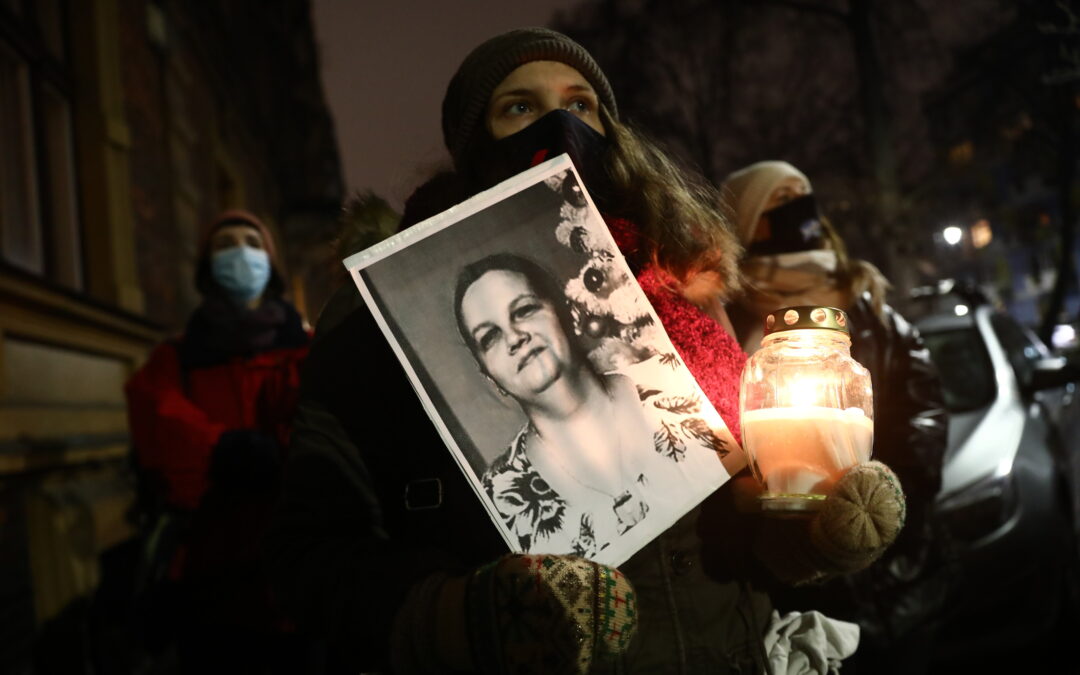Prosecutors investigating the death of a woman in hospital last month – which her family and activists blame on Poland’s strict abortion law – have exhumed the remains of the twin foetuses she had been carrying and have interviewed her husband and sister.
The death of 37-year-old Agnieszka, a mother of three, has drawn widespread attention and controversy. After one of her foetuses died on 23 December, she was made to carry it for over a week while doctors waited to see what happened to its still-living twin.
When the twin subsequently also died, both foetuses were removed on 31 December. Agnieszka then fell seriously ill – with sepsis, according to her family – and remained in hospital. She died on 25 January, shortly after testing positive for coronavirus.
Her family say that her death was the result of the near-total ban on abortion introduced last year, and accuse the government of having “blood on its hands”. The hospital says it took “all necessary measures to save the lives of the children and the patient”.
A woman has died after having to carry a dead foetus in her womb for over a week.
Activists blame Poland's near-total abortion ban for making doctors reluctant to terminate such pregnancies, and her family say "the government has blood on its hands" https://t.co/Sy89Wc8MCt
— Notes from Poland 🇵🇱 (@notesfrompoland) January 26, 2022
Prosecutors in Częstochowa, where the events took place, immediately opened an investigation into whether the hospital was responsible for her death. The case has now been transferred to the regional prosecutor’s office in Katowice.
“The husband of the deceased woman and her sister have already been questioned and on Thursday the foetuses were exhumed,” prosecutor Agnieszka Wichary told the Polish Press Agency (PAP).
She added that experts from the Department of Forensic Medicine in Szczecin had been appointed to provide an opinion on Agnieszka’s death. Separately, the case is also being investigated by the health ministry’s national consultant for obstetrics and gynaecology and the commissioner for patients’ rights.
Last week, a leading obstetrics doctor, Maciej Socha, told liberal news website OKO.press that, although he is a strong opponent of Poland’s abortion law, it had nothing to do with Agnieszka’s death. He said that, according to the information available, doctors treating her had acted in a manner justified and consistent with global standards.
For the record: it has transpired that Agnieszka’s death was *not* a result of malpractice connected to the current abortion law in Poland. This has been confirmed by a gynaecologist who is an outspoken critic of the law. Source: https://t.co/feH0BnQTSG
— Dr Marta Zboralska (@marta_zboralska) January 29, 2022
Opposition politicians and activists have, however, continued to blame the abortion law for discouraging doctors from terminating Agnieszka’s pregnancy. “By banning abortion, the murderers from PIS [the ruling party] prepared agony, torment and death for her,” said Marta Lempart, leader of mass protests against the abortion law.
“We told you that the constitutional court ruling [introducing a near-total abortion ban] would have a chilling effect,” said left-wing MP Marcelina Zawisza, quoted by Gazeta.pl. “You didn’t believe us. And now you have the blood of another woman on your hands.”
Monika Wielichowska, an MP from the centrist Civic Coalition (KO), Poland’s largest opposition group, likewise said that both Agnieszka and Iza – another pregnant woman who died last year – “are victims of the…cruel, barbaric [abortion] law prepared by politicians who hate women”.
Defenders of the abortion law, however, pointed to the fact that it explicitly allows a pregnancy to be terminated if it threatens the mother’s health or life. They also note that, in the case of Iza, an investigation attributed her death to medical error.
Main image credit: Jakub Porzycki / Agencja Wyborcza.pl

Daniel Tilles is editor-in-chief of Notes from Poland. He has written on Polish affairs for a wide range of publications, including Foreign Policy, POLITICO Europe, EUobserver and Dziennik Gazeta Prawna.




















